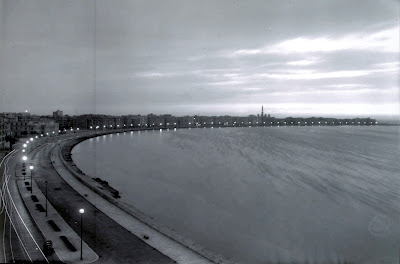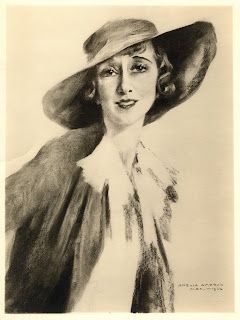 |
| The Ambron Villa in April 2010 seen from what had been the garden at the rear. Photographed by Justin Tuijl. |
An
article in today’s Telegraph speaks of a campaign to save the house where Lawrence Durrell, the author of The Alexandria Quartet, lived during his
time in the city in the Second World War. (To read the article, click here.)
Durrell and his Alexandrian girlfriend Eve Cohen - who would later become his wife and who also inspired the character of Justine - moved into the upper floor of the house - the Villa Ambron - with a number of friends in October 1943. Down below lived the owners, Aldo Ambron and his wife Amelia, and their daughter Gilda.
 |
| Eve at 19 Rue Mamoun in 1999. |
In an earlier post I said something of my visit to Alexandria with Eve Durrell in 1999. We also went round to the Villa Ambron which was already in the hands of the developer.
 |
| Behind the sheet metal the villa was being ripped apart. |
The developer had bought the property in the mid 1990s with plans to build
several blocks of flats in place of the villa and the artists' studio in the garden.
There are laws protecting old villas in Alexandria, but in Egypt the law is there to be abused and old villas are there to be knocked down. And so it would have been with the Villa Ambron except that unfortunately for the developer a famous writer had once lived there. Nevertheless damage has been systematically if furtively inflicted on the villa and the studio in an attempt to make them fall down.
In another tactic, as reported in the Egyptian press, the developer demanded the demolition of the villa because it had been inhabited by a kafir. In Islam a kafir is an unbeliever, an infidel, a person who rejects God and denies the Islamic version of the truth. A kafir is the worst charge you can lay against a person; a kafir is beyond the pale and has no human rights; all his property is forfeit and his wife and his daughters too. The kafir of course was Lawrence Durrell.
Failing that ploy, the developer, Mr Abdulaziz
Ahmed Abdulaziz, is happy to sell the property that he never had the
right to develop for five million dollars to the British Council.
 |
| The balustrades of the entrance stairway had been deliberately smashed. The columns on either side support a balcony where Durrell and Eve used to entertain their friends. |
As Eve and I stood there looking at the villa which was being systematically destroyed, in a city without memory, she reminisced about how things used to be.
 |
| Although Paul Gotch took this photograph with a bad roll of film, it is just possible to see two people, probably Durrell and Eve, standing in the doorway of the tower. |
Eve recalled how Durrell would often ask her up to his tower; her presence did not disturb his writing. 'I was in those days a very silent person, I hardly ever spoke - this was because I was still coming out of my past.'
The people Eve had known before were one dimensional compared to the Villa Ambron dwellers and visitors. 'It was as if I had suddenly got myself into a book, of the characters of a book coming alive. I wasn't sure what my part was doing, but I was happy to observe.'
Eve said that for all of them, for Durrell and herself and for everyone who lived at the Villa Ambron, 'those were the best years of our lives'.
 |
| Aldo Ambron with the dark hair, staring at the camera. |
 |
| Alexandria's Eastern Harbour in the 19th century. |
 | |||
| The graceful sweep of the Eastern Harbour Corniche, the work of the Almagia family. |
 |
| Prince Nicholas Romanov, heir to the Russian imperial throne, and Gilda Ambron. |
Eve described Gilda as short and dumpy but said she had an animated face and was good fun. Gilda, Eve said, 'was besotted with Larry, in a proper way: she was une fille de bonne famille, and she behaved beautifully'. 'Gilda adored Larry', Paul Gotch recalled. 'She was in love with him.'
At the end of the war Durrell left Alexandria to take up the post of British Information Officer on the Greek island of Rhodes, and it was there that he heard that Gilda had been killed in an air crash.
Durrell was
shocked when he heard the news; it was as though it spelt the end of
the Ambrons, said Eve: 'That world we had known at the Ambron villa had already
become unreal'.
Gilda Ambron was the only Alexandrian whose real name would appear in the Quartet. Twice in Balthazar, the second volume, Durrell rolls out 'the majestic poetry of the names which had come to mean so much to me, the names of the Alexandrians', and on each occasion, though the order of the names is changed, he ends with a falling toll on Gilda Ambron.
Gilda Ambron was the only Alexandrian whose real name would appear in the Quartet. Twice in Balthazar, the second volume, Durrell rolls out 'the majestic poetry of the names which had come to mean so much to me, the names of the Alexandrians', and on each occasion, though the order of the names is changed, he ends with a falling toll on Gilda Ambron.
This was Alexandria, the unconsciously poetical mother-city exemplified in the names and faces which made up her history. Listen.
Tony Umbada, Baldassaro Trivizani, Claude Amaril, Paul Capodistria, Dmitri Randidi, Onouphrios Papas, Count Banubula, Jacques de Guery, Athena Trasha, Djamboulat Bey, Delphine de Francueil, General Cervoni, Ahmed Hassan Pacha, Pozzo di Borgo, Pierre Balbz, Gaston Phipps, Haddad Fahmy Amin, Mehmet Adm, Wilmot Pierrefeu, Toto de Brunel, Colonel Neguib, Dante Borromeo, Benedict Dangeau, Pia dei Tolomei, Gilda Ambron. ... The poetry and history of commerce, the rhyme-schemes of the Levant which had swallowed Venice and Genoa. (Names which the passer-by may one day read upon the tombs in the cemetery.)
 |
| The last of the Alexandrians. |
To read more posts on Alexandria, please click here.
*
Two books by Michael Haag for the story of cosmopolitan Alexandria.
 |
| Alexandria: City of Memory (Yale University Press and American University in Cairo Press) |
 |
| Vintage Alexandria (American University in Cairo Press) |



